#mct oil benefits brain
Text
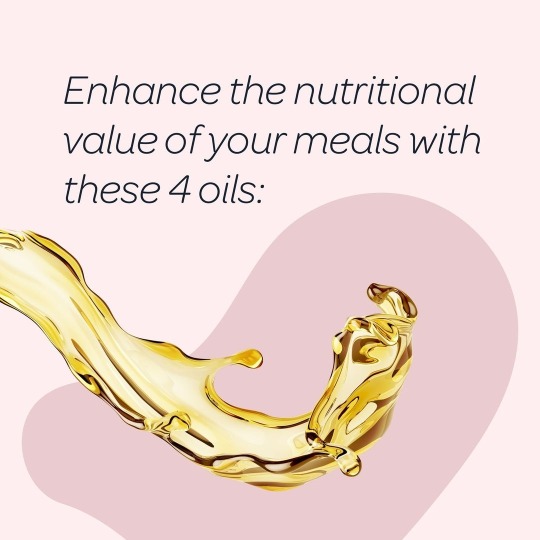
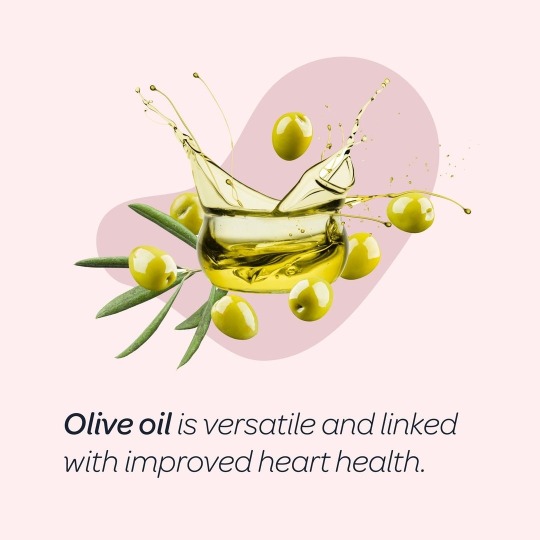
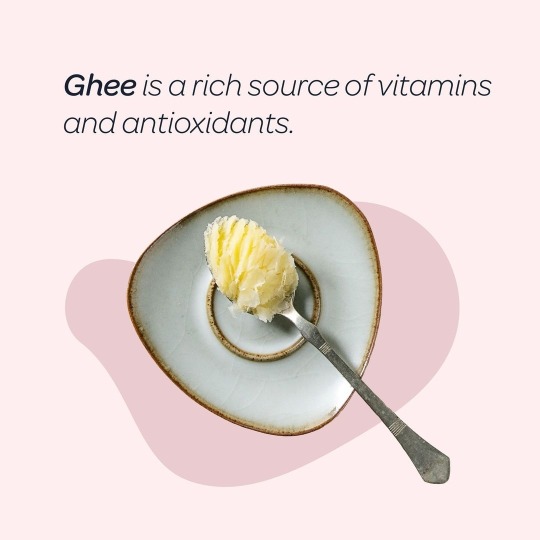
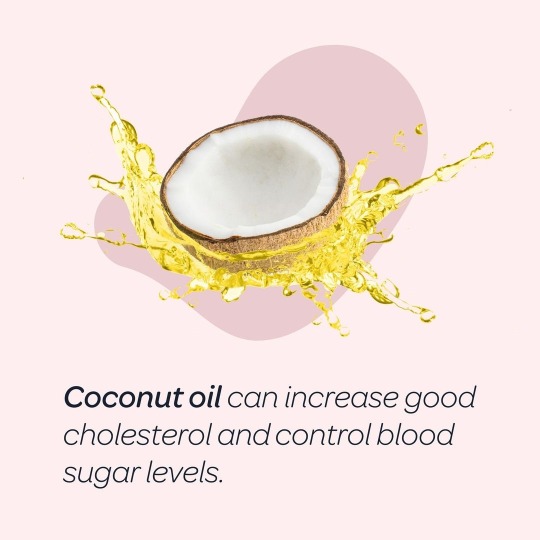
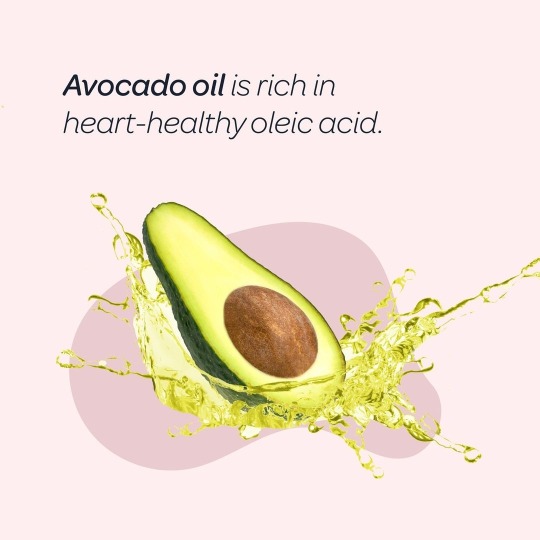
Cooking with oil often gets a bad rap, but not all oils are created equal.
Healthy oils offer many useful benefits when incorporated into a balanced diet. Although it is recommended to avoid highly refined oils that lack essential nutrients such as canola, sunflower, corn and vegetable oil, certain ones should be included in some of your favorite recipes!
Enhance the nutritional value of your meals with these 4 oils:
💛 𝗢𝗹𝗶𝘃𝗲 𝗼𝗶𝗹
Extra virgin olive oil is one of the most versatile oils and many studies have linked it to improved heart health.
💛 𝗚𝗵𝗲𝗲
Ghee, or clarified butter, is a rich source of vitamins, antioxidants, and healthy fats. The milk solids are removed from butter, resulting in a product that contains only beneficial fats and is less likely to cause inflammation.
💛 𝗖𝗼𝗰𝗼𝗻𝘂𝘁 𝗼𝗶𝗹
When used in moderation, coconut oil has the potential to increase good cholesterol and help control blood sugar levels. The medium chain triglycerides (MCT) in coconut oil are thought to be especially beneficial for brain health.
💛 𝗔𝘃𝗼𝗰𝗮𝗱𝗼 𝗼𝗶𝗹
Avocado oil is rich in heart-healthy oleic acid, a monounsaturated omega-9 fatty acid.
Substituting unhealthy oils and fats for these healthy alternatives is a simple and easy way to improve your overall health and well-being!
12 notes
·
View notes
Text
STORY AT-A-GLANCE
Endogenous ketone production is an emergency response that relies on the activation of stress hormones. For this reason, I suspect chronic ketosis may be inadvisable. Taking exogenous ketones, however, does not activate stress hormones, and can be very helpful in some instances
While ketones are generally known to be good for your brain and lower inflammation, your brain cannot function on ketones alone. It requires glucose. If you do not consume enough carbs, your body will sacrifice muscle tissue to make the glucose it needs
There are several different types of ketone products available, including MCT-C8 oil, racemic ketone salts (beta-hydroxybutyrate), chiral ketone salts (D-beta-hydroxybutyrate), ketone esters and R 1,3-butanediol
One of the best therapeutic applications for exogenous ketones is when you need to decrease oxidative stress, such as when getting a CT scan, x-ray or chemotherapy, or when flying
On the rare occasion where radiation or chemo may be warranted, high doses of ketone esters may help protect healthy cells from being damaged, specifically your immune cells
In this interview, Frank Llosa, founder and CEO of KetoneAid Inc., and I discuss the pros and cons of exogenous ketones (supplemental ketones). Your body makes ketones under certain conditions (so-called endogenous ketones), but you can also take them orally.
I used to take ketones, but over the past year or so have changed my position on this. I now believe that it’s relatively unhealthy for your body to create ketones on a chronic basis. Not that you should never do it, but it’s an emergency mechanism that requires the activation of stress hormones.
There’s great value to that, and it can keep you alive. But it’s an emergency response. You're going to have to activate cortisol, adrenaline and glucagon, and that choice will worsen, not improve, your biology over time. That doesn’t mean ketones are dangerous. They're a powerful tool that, when used selectively, can indeed improve your health. We're discuss that in this interview.
But if you choose to allow your body to produce high levels of ketones, be aware that there's another side to it that's rarely ever discussed, which is the activation of the stress hormones. If you rarely do this there is no problem, as it is a rescue mechanism designed to keep you alive in times of food scarcity. But if you do it every day, I think you're asking for trouble.
Llosa started exploring the exogenous ketones business by way of the late Dr. Richard Veech, a prominent ketone expert. Veech was his wife’s godfather. Veech had been sitting on a ketone ester for 10 years and couldn’t get it to market. So, that’s where Llosa got involved.
Benefits and Drawbacks of Ketones
While ketones are generally known to be good for your brain and lower inflammation, your brain cannot function on ketones alone. It’s biologically impossible. It requires glucose. Llosa cites research from the 1970s where they water fasted people for up to 60 days, and by the end they were able to produce energy through endogenous ketones alone.
However, once you understand how glucogenesis works, it’s clear that they still had glucose in the brain. Your body absolutely requires glucose, but you don’t have to eat it. However, it requires it so much that if you fail to consume glucose, it will sacrifice your muscles to create it endogenously.
Your body will break down muscle tissue and convert it into glucose by releasing the stress hormones adrenaline, glucagon and cortisol. That’s what activates the destruction of lean muscle mass and bones. Even some brain tissue may be sacrificed to create glucose. So, you must have glucose. If your blood glucose ever goes down to zero, you'll die.
Ketones are indeed a great fuel, it does a lot of good things for your body, but you still need glucose. And if you want to really optimize your biology, the ideal way is to give your body the glucose it needs, along with a smaller amount of ketones. Two ways of doing that is by fasting (which activates stress hormones) or by taking exogenous ketones.
During a personal experiment, Llosa achieved very high ketone levels, but people started commenting that he looked sickly. While he felt great, he was underweight. His wife also experimented with a ketogenic diet and got the “keto flu.”
“She was in a fetal position in bed with her eyes bulging, heart racing,” he says. Llosa ended up calling on a couple of experts, who recommended giving her 10 capsules of pure salt. While he was skeptical, the salt had her feeling fine within 10 minutes. “It was just a salt depletion,” he says.
This tends to be a very common problem and is one of the reasons people say the keto diet didn’t work for them. Ketogenic diets cause tremendous salt loss, and most simply don’t add enough salt back in. All of that said, there are certainly benefits to ketones. The primary one being anti-inflammatory effects. Some also experience dramatic cognitive benefits. As explained by Llosa:
“For cognition, the more of an issue you have with glucose reaching the brain, the more of a benefit you have. So, some people will drink it, whether it's any of these exogenous ketones and feel nothing in the brain. But your brain is being fueled by 100% or 95% [glucose], there is no improvement to be had.
Scientist Steve Koonin talked about the brain energy gap. So, the bigger the gap, the percentage of the brain that can be fueled by glucose, it could be 60%, 70%. When you add exogenous ketones, it uses a different pathway, reaches the brain and gets you closer to that 100%.
So, some people, for example, TBI [traumatic brain injured] people, they have brain fog, they take the ketone ester and it is instant, immediate, and predictable, within 15 minutes. So, the bigger the [energy] gap, the more you feel it.”
The Different Kinds of Exogenous Ketones
At present, there are several different types of ketone products available, including the following:
•MCT-C8 oil — MCT oil is a dietary fat, so it counts toward your macro nutrients. However, 10% to 15% of it goes through the liver and creates ketones (D-beta-hydroxybutyrate). As noted by Llosa, theoretically, you could take some MCT oil with a piece of store-bought cake and still raise your ketones. This rise is not an indication that you’re burning fat, however.
•Racemic ketone salts (beta-hydroxybutyrate) — These were the first exogenous ketones on the market, but they are hardly worth the investment, as they barely raise your ketone levels. “You'd have an entire serving of ketone salts and be lucky if you get a 0.3 rise in your millimolars,” Llosa says.
“If you took the capsules of racemic salts, maybe if you took half of the bottle, 15 out of the 30 capsules, you might be able to have a 0.2, 0.3 rise.” One of the reasons people claimed they worked to prevent keto flu is because ketone salts are very high in salt. But you can get the same effect simply taking pink Himalayan salt and save a ton of money.
•Chiral ketone salts (D-beta-hydroxybutyrate) — The chiral version of the salts, which is more expensive to produce and therefore retails for a higher price.
•Ketone ester — This is D-beta-hydroxybutyrate, the free acid form, bound to R 1,3-butanediol (also known as D 1,3-butanediol). This allows the ester to enter your bloodstream intact. As explained by Llosa, “once in your bloodstream, enzymes will separate it, giving you a quick release of D-beta-hydroxybutyrate, the same molecule that your body makes when it burns fat.
Then, R 1,3-butanediol goes through the liver and 80% of that converts to ketone. So, you have a fast release and a slow release.”
Within the ester group, there are several different versions, including monoester (developed by Veech); D-beta-hydroxybutyrate bound to two or three glycerol molecules (which is not nearly as effective); and esters made with C8, which works best when taken with food. Ketone monoester does not have good absorption when taken with food.
So, if you need to take it with food to limit glucose spikes, the C8 ester may be a better choice. But for a fasted workout, the monoester is far superior. There’s also a ketone ester made with C8 bonded to R 1,3-butanediol, but it’s not nearly as bioavailable, while being one of the priciest.
•R 1,3-butanediol — This is half of the molecule of the ketone ester (D-beta-hydroxybutyrate bound to R 1,3). Technically, 1,3-butanediol is an alcohol (but not ethanol), so it can give you a buzz. Llosa started a company called Hard Ketones that focuses on R 1,3-butanediol as an alcohol alternative that works on your GABA receptors.
This product is primarily aimed at helping people quit alcohol. As explained by Llosa, “the weird thing about this drink is, because of the ghrelin effect, it lowers your desire for itself. So normally with a beer, you desire another beer, and another beer.
But with this, people have one or two and they just don't crave a third, fourth, fifth. The brain craves acetic acid as part of the cycle of ethanol. The R 1,3-butanediol converts to a four-carbon version of acetaldehyde that is not as bioavailable, so the body can't use it as a toxin, and then it goes on to quickly convert to beta-hydroxybutyrate ketones.”

Save This Article for Later - Get the PDF Now
Download PDF
Racemic Versus Chiral Ketone Salts
To understand the difference between racemic and chiral salts, imagine you have a pair of gloves, one for your left hand and one for your right hand. In a racemic ketone salt, you have an equal mix of these "left-handed" and "right-handed" molecules, also referred to as “D” (or R, for “right”) and “L” for “left.”
Just like your gloves, these molecules look similar but are mirror images of each other and cannot be superimposed onto one another. In chemistry, we say that the mixture is racemic because it has equal parts of these mirror-image forms.
Now, imagine if you had a pair of gloves but they were both for the same hand — let's say two left-hand gloves. In chiral ketone salts, instead of having a mix, you have molecules that are all "left-handed" (or all "right-handed"). The term "chiral" refers to a substance that does not have an identical mirror image — just like your pair of left-handed gloves.
In the context of ketone salts, this means the product is made up predominantly of one type of molecule, either the 'left-hand' or the 'right-hand' version, not a mix of both.
In our bodies, these differences can be important. Just like only one of your gloves will fit on each hand, only one form of a ketone molecule might be effectively used by the body. While racemic ketone salts offer a mix, which might not be fully utilized, chiral ketone salts provide a specific form that can be recognized and used by your body.
Ketone Esters Protect Against Oxidative Stress
According to Llosa, the ketone ester is better for brain sharpness and sports performance, while the hard ketones induce relaxation. In my view, one of the best therapeutic applications for exogenous ketones is when you need to decrease oxidative stress, such as when getting a CT scan, x-ray or chemotherapy, or when flying. All of these cause oxidative stress that ketone esters can protect against. Llosa comments:
“There's going to be a paper coming out within a month; it's been seven years in the making, and it was briefly touched upon in a chemistry book, which is why I can mention it, where they gave mice enough radiation so that 70% of the mice died.
They took another group and gave them ketone ester either before and after, or just after. When they took it before and after, 100% of them survived and then lived just as long [as unexposed mice]. If they were taking just afterward, 90% of them survived. That is going to be, I think, a groundbreaking paper. It's going to open up so many possibilities.
As far as for cancer, what we really need … is to make sure that the radiation only protects the good cells and doesn't accidentally protect the bad cells. Travis Christofferson who wrote the book, ‘Ketones Is the Fourth Fuel.’ Great book to take a deep dive on this. He explained to me, but not in a way that I can re-explain, that the good cancer cells are protected and the bad cancer cells shouldn't be protected.
So, for potential cancer, you would want to make sure that it's only protecting the good cells and not accidentally protecting the bad cells. Because that mice study just shows that it protects the entire body, it doesn't show the difference that you need.
In cancer radiation, it's a fine balance between how much radiation you give to kill the cancer versus killing the host. You don't want to kill the person with too much radiation. So, if you have an opportunity to be more aggressive on the radiation, or protect from that, that has a lot of prospects.”
I firmly recommend against chemotherapy for cancer, as you’re sabotaging your ability to survive. However, on the rare occasion where radiation or chemo may be warranted, you’d be foolish not to consider high doses of ketone esters, as it will likely protect healthy cells from being damaged, specifically your immune cells.
When you knock out your immune system, your ability to fight cancer almost disappears. So, you must be careful. As a general guidance, Llosa suggests preloading before chemotherapy, taking two to four servings per day (10 to 20 millimolar) for two or three days. That said, Llosa warns that there’s no scientific evidence to support specific dosages or frequency, so it’s something you’d have to experiment with.
Again, to be clear, while I believe raising your endogenous ketones can do more harm than good for most people, taking an exogenous ketone product is a different story, because you're not activating stress hormones.
Why I Don’t Recommend Chronic Keto
While Llosa believes the ideal diet is a low glycemic index, non-ketogenic diet with exogenous ketones, I disagree strongly with that. The reason being that glucose is the primary fuel for your mitochondria. Unfortunately, most people's microbiome is seriously dysfunctional as a result of eating too much refined sugar.
Refined sugar feeds gram negative bacteria that produce endotoxin. If your pathogenic bacterial load in your colon is high, even healthy carbs like ripe fruit can cause problems, as the fiber will feed the bad bacteria. However, if your microbiome is healthy, then you can eat fruit and even starches without problems.
I typically eat between 400 and 500 grams of carbs a day, and I know many who eat 600 grams of carbs a day, yet have totally normal blood sugars and normal glycohemoglobin, because our mitochondria can burn glucose effectively. We have a very active metabolism, so we can burn that fuel.
Many, like Llosa, focus on low glycemic because that's the way most people achieve normal blood sugar. But I believe it's far from ideal, because if you have a low-glycemic diet, you still run the risk of activating the stress hormones. If your carb intake is too low, you're going to activate adrenaline and cortisol, and if you activate them all the time, you're going to run into trouble.
The other component of this is that you need to be insulin sensitive. Ideally, you’d want a fasting insulin level below 2 or even 1.5. If your fasting insulin is 5 or 10, then the glucose spike caused by, say, a glass of orange juice, is going to be problematic. If your mitochondrial function and metabolism are good, then your glucose level will temporarily spike and go right back down.
More Information
To learn more about Llosa’s products, visit ketoneaid.com and hardketones.com. In closing, Llosa comments:
“I think the takeaway is that this isn't a supplement. We call it a food. People have to take supplements for 10 to 30 days to maybe feel something. This is something that you feel immediately, or in one or two days.”
2 notes
·
View notes
Text
The Truth Behind Keto Coffee: Does It Really Help You Lose Weight?

Are you a coffee lover who's been hearing about the wonders of keto coffee? Maybe you're curious about whether it can actually help you shed those extra pounds. Keto coffee, also known as bulletproof coffee, has gained popularity among those following low-carb diets like the ketogenic diet. It's a unique blend of black coffee, grass-fed butter, and medium-chain triglyceride (MCT) oil. But does this concoction live up to the hype? In this article, we'll take a deep dive into the world of keto coffee and explore its potential effects on weight loss.
Embark on a Life-Changing Voyage with the Ultimate Keto Meal Plan!
Understanding Keto Coffee
What Sets Keto Coffee Apart?
Keto coffee is not your average cup of joe. Unlike regular coffee, which is often consumed with milk, sugar, or creamers, keto coffee is packed with healthy fats and protein that can help keep you feeling full and energized. While black coffee is naturally low in carbs and suitable for a ketogenic diet, traditional coffee additions like sugar and creamers can quickly add up in terms of carbohydrates. On the other hand, keto coffee contains only around 1 net gram of carbs per cup and is rich in keto-friendly fats like MCT oil and grass-fed butter.
The Science Behind Keto Coffee
To understand how keto coffee may impact weight loss, it's essential to grasp the underlying principles of the ketogenic diet. The ketogenic diet is a high-fat, low-carb eating plan that aims to shift the body's primary fuel source from carbohydrates to fats. By limiting carb intake, the body enters a metabolic state called ketosis, in which it starts to burn stored fat for energy. Keto coffee aligns with this philosophy by providing the body with a source of healthy fats that can be converted into ketones, the energy molecules produced during ketosis.
The Potential Benefits of Keto Coffee
Feeling Fuller for Longer
One of the claimed benefits of keto coffee is its ability to keep you satiated for extended periods. The combination of butter and MCT oil, both rich in calories and healthy fats, can help curb hunger pangs and prevent overeating throughout the day. Unlike a carb-heavy breakfast that may leave you hungry shortly after, keto coffee's high-fat content can provide a sense of fullness, making it an attractive option for those looking to control their calorie intake.
Promoting Weight Loss
When incorporated as part of a balanced diet, keto coffee may contribute to weight loss efforts. The ketogenic diet's core principle of using fat as the primary fuel source aligns with the potential benefits of keto coffee. By supplying the body with healthy fats, keto coffee can support the process of burning stored fat for energy. Additionally, the feeling of fullness it provides can help reduce overall calorie consumption, making it easier to maintain a calorie deficit, a crucial factor in weight loss.
Embark on a Life-Changing Voyage with the Ultimate Keto Meal Plan!
Supporting Overall Health
Keto coffee's ingredients also offer potential health benefits beyond weight loss. Grass-fed butter, a key component of keto coffee, contains conjugated linoleic acid (CLA), which has been associated with weight loss and potential reductions in the risk of heart disease, cancer, and type-2 diabetes. MCT oil, another essential ingredient, has been linked to improved brain function, increased focus, and decreased cravings. These added health benefits make keto coffee an enticing option for those seeking a well-rounded approach to their overall well-being.
Boosting Energy Levels
While coffee alone is known for its energy-boosting effects, keto coffee takes it a step further. MCT oil, a primary ingredient in keto coffee, is quickly converted into ketones by the liver, providing a readily available source of fuel. This can result in sustained energy levels throughout the day, reducing the need for mid-morning or afternoon slumps. The combination of caffeine from coffee and the metabolism-boosting properties of MCT oil can provide a powerful pick-me-up to help you stay focused and productive.
Potential Reduction of Diabetes Risk
In addition to its potential weight loss benefits, keto coffee might also assist in reducing the risk of type-2 diabetes. Research suggests that MCT oil consumption, alongside caffeine, can contribute to weight control, which is a critical factor in preventing type-2 diabetes. By helping regulate weight and fat stores, keto coffee may have a positive impact on overall metabolic health and reduce the risk of developing diabetes.
Considerations and Drawbacks of Keto Coffee
While keto coffee offers potential benefits, it's important to consider some of the drawbacks and potential concerns associated with its consumption.
Caloric Content and Weight Gain
Keto coffee, with its high fat content, can be calorie-dense. This means that if you add it to your regular breakfast routine without adjusting your overall calorie intake, it could lead to weight gain. It's crucial to be mindful of the total calories you consume throughout the day and ensure that keto coffee is incorporated as part of a well-balanced diet.
Saturated Fat Intake
One aspect of keto coffee that warrants caution is its saturated fat content. While the ketogenic diet allows for higher fat intake, excessive consumption of saturated fats has been linked to increased risks of heart disease, stroke, and diabetes. It's essential to choose high-quality sources of fats, such as grass-fed butter, and to moderate your saturated fat intake overall.
Cholesterol Levels
The consumption of butter in keto coffee has the potential to impact cholesterol levels. Butter, particularly when compared to other fat sources, has been found to raise low-density lipoprotein (LDL) cholesterol levels. Elevated LDL cholesterol is associated with an increased risk of heart disease. It's important to monitor your cholesterol levels regularly and consult with a healthcare professional if you have concerns about your cardiovascular health.
The Bottom Line
Keto coffee, with its unique blend of coffee, grass-fed butter, and MCT oil, has gained popularity for its potential weight loss benefits and additional health advantages. While it can help keep you feeling full, support weight loss efforts, and provide sustained energy, it's essential to approach keto coffee with caution. Be mindful of the caloric content and saturated fat intake, and consider the overall balance of your diet. As with any dietary change, it's always a good idea to consult with a healthcare professional before incorporating keto coffee or making significant modifications to your eating habits.
Embark on a Life-Changing Voyage with the Ultimate Keto Meal Plan!
Check out this Keto Start Here Video
#keto#keto coffee#keto diet#keto recipes#lose weight#i wanna lose weight#keto weight loss#keto meal plan
5 notes
·
View notes
Text
How İs Nutrition İmportant?

The ketogenic diet is a low-carbohydrate, high-fat diet that has gained popularity in recent years for its potential health benefits, including weight loss, improved blood sugar control, and reduced inflammation. Here are some popular keto foods that have a high nutritional value:
Nuts and seeds: Nuts and seeds are a good source of healthy fats, protein, fiber, and micronutrients. Some popular options include almonds, macadamia nuts, walnuts, chia seeds, and flaxseeds.
My commented: https://amzn.to/3Ym9g2O, https://amzn.to/3SOZ1Tk, https://amzn.to/3muLS5D, https://amzn.to/3muLUdL
Coconut oil: Coconut oil is a popular source of healthy fats on the keto diet. It contains medium-chain triglycerides (MCTs), which are quickly metabolized into ketones by the liver, making it a great source of energy for the body.
My commented: https://amzn.to/3ZFus4B, https://amzn.to/3ybpQaX, https://amzn.to/3F0mlbb, https://amzn.to/3ZeXfgJ
Eggs: Eggs are a good source of protein, healthy fats, and micronutrients, including vitamin D and choline. They are also versatile and can be cooked in many different ways.
My commented: https://amzn.to/3F0mrj3
Fatty fish: Fatty fish, such as salmon, mackerel, and sardines, are a good source of omega-3 fatty acids, which have anti-inflammatory properties and are important for brain health.
My commented: https://amzn.to/3KXpe04, https://amzn.to/4200nz1, https://amzn.to/41Pdi6q, https://amzn.to/3JfVKcv
Cheese: Cheese is a good source of protein, calcium, and vitamin D. It can be included in moderation on the keto diet, but it’s important to choose high-quality, full-fat options.
It’s important to note that while these foods are high in nutritional value, they should be consumed in the context of a well-rounded, balanced diet. The ketogenic diet can be restrictive, and it’s important to work with a healthcare professional or registered dietitian to ensure that your nutritional needs are being met.
#weight loss#diet#healthy eating#healthy food#health#metabolism#healthy weight loss#calorias#nutrition#fat loss#lifestyle changes#healthy lifestyle#meal planning#portion control#losing weight#weight loss diet#ketogenic#vitamins#food#balanced diet
2 notes
·
View notes
Text
Medium Chain Triglycerides Market: Unlocking Opportunities in Health Supplements

Medium chain triglycerides, also known as MCTs, are a type of fatty acid that has numerous health benefits. MCTs are extracted from coconut and palm kernel oils and have particular properties that make them different from other fats.
Chemical Composition of MCTs
MCTs contain fatty acids that are composed of 6-12 carbon atoms in length. The two most common types of MCTs found in coconut and palm kernel oils are caprylic acid (C8) and capric acid (C10). These medium chain fatty acids are metabolized differently compared to long chain fatty acids found in other dietary fats and oils.
Unique Metabolism of MCTs
After being consumed, MCTs do not require bile or pancreatic enzymes for digestion and absorption like other fats. They are absorbed directly into the portal vein and transported to the liver. In the liver, MCTs are quickly converted into ketone bodies which can be used as an immediate energy source for the brain and muscles. This unique metabolism allows MCTs to provide rapid and sustained energy.
Weight Management Properties
Several studies have found MCTs to be more effective for weight loss compared to other fats. When MCTs are metabolized in the liver, they produce significantly greater feelings of fullness compared to long chain triglycerides. This early satiety helps reduce calorie intake and promote weight loss over time. MCTs also increase 24-hour energy expenditure by as much as 5%, boosting fat burning. Supplementing the diet with MCT oil has led to decreased body weight and abdominal fat in clinical trials.
Brain and Cognitive Health
As MCTs are readily converted into ketone bodies, they provide an alternate source of fuel for the brain besides glucose. This makes MCTs especially beneficial for individuals with neurological disorders like Alzheimer's and epilepsy that impair brain energy metabolism. Studies show MCT supplementation improves symptoms in Alzheimer's patients by increasing availability of ketones to brain cells. MCTs may also enhance cognitive function and focus in healthy individuals.
Heart Healthy Fats
Recent research suggests Medium Chain Triglycerides can improve heart health when consumed as part of a healthy diet. Ingesting MCTs raises levels of HDL "good" cholesterol while lowering levels of triglycerides and LDL "bad" cholesterol. This lipid profile shift is associated with reduced risk of heart disease. MCTs have also demonstrated anti-inflammatory properties shown to protect against atherosclerosis development. Their ability to increase ketone production benefits heart health by serving as an alternate fuel for heart muscle cells.
Immune System Support
Functional fats like MCTs play an important role in immune function and defense against infections. MCTs have demonstrated immune-modulating effects through enhancement of white blood cell activity and antibody responses. They protect gastrointestinal, respiratory and urinary tract health by inhibiting microbial biofilm formation and reducing inflammation. Incorporating MCT sources like coconut oil in the daily diet supports optimal immune system functioning throughout life.
In conclusion, medium chain triglycerides have unique properties that set them apart from other common dietary fats and oils. Their distinctive metabolism and ability to serve as an efficient energy source for the brain and body endow MCTs with therapeutic effects for weight management, heart health, digestion and immune function. Incorporating MCT sources like coconut oil and MCT oil powder into a balanced diet offers numerous evidence-based health advantages.
0 notes
Text
Navigating the Keto Diet: Supplements and Tips for Success
The ketogenic diet, or keto diet, has gained popularity for its potential to support weight loss and improve metabolic health. This low-carbohydrate, high-fat diet prompts the body to enter a state of ketosis, where it relies on ketones for energy instead of glucose. While the keto diet can offer various benefits, it also comes with specific challenges and considerations. In this comprehensive guide, we'll explore the essentials of the keto diet, discuss common pitfalls, and provide tips and supplements to help you navigate the keto journey successfully.
Understanding the Keto Diet
1. Macronutrient Ratios:
The standard keto diet typically consists of approximately 70-75% of calories from fats, 20-25% from protein, and 5-10% from carbohydrates. This strict reduction in carbs forces the body to burn stored fat for fuel, leading to weight loss.
2. Ketosis:
Ketosis is a metabolic state in which the body produces ketones from fat breakdown. Ketones serve as an alternative energy source, particularly for the brain, when glucose availability is limited.
3. Foods to Include:
Healthy fats like avocados, olive oil, and nuts, along with moderate protein sources such as meat, fish, and eggs, form the foundation of a keto-friendly diet. Non-starchy vegetables are also encouraged [3].
Common Challenges on the Keto Diet
1. Keto Flu:
As the body adapts to using ketones, some individuals may experience flu-like symptoms, including fatigue, headaches, and irritability. This transitional phase is known as the keto flu.
2. Electrolyte Imbalance:
The keto diet can lead to increased water loss and potential electrolyte imbalances. Adequate intake of sodium, potassium, and magnesium becomes crucial .
3. Digestive Issues:
A sudden increase in dietary fats may cause digestive issues like constipation. Including fiber-rich vegetables and staying hydrated can help alleviate this challenge .
Tips for Success on the Keto Diet
1. Gradual Transition:
Ease into the keto diet by gradually reducing carbohydrate intake. This can help minimize the impact of the keto flu and improve long-term adherence.
2. Hydration:
Stay well-hydrated to support kidney function and compensate for increased water loss on the keto diet. Adequate hydration also helps prevent constipation.
3. Electrolyte Supplementation:
Consider supplementing with electrolytes, especially during the initial phases of the keto diet. This can help prevent electrolyte imbalances and associated symptoms .
4. Fiber Intake:
Incorporate fiber from low-carb vegetables and avocados to support digestive health and alleviate constipation .
5. Healthy Fats:
Prioritize healthy fats like avocados, olive oil, and fatty fish for a well-rounded nutrient profile. These fats also provide essential fatty acids and fat-soluble vitamins.
Supplements to Support the Keto Diet
1. Electrolyte Supplements:
To address potential imbalances, electrolyte supplements containing sodium, potassium, and magnesium can be beneficial.
2. MCT Oil:
Medium-chain triglyceride (MCT) oil provides a quick source of energy and can aid in reaching ketosis faster. Start with small amounts to assess tolerance .
3. Exogenous Ketones:
Exogenous ketones, available in supplement form, can provide additional ketones to support energy levels duringthe adaptation phase.
4. Multivitamins:
A high-quality multivitamin can help fill potential nutrient gaps, ensuring you receive essential vitamins and minerals while on the keto diet .
Conclusion
The keto diet can be a powerful tool for those seeking weight loss and metabolic improvements. However, it requires careful planning and consideration of potential challenges. By understanding the principles of the keto diet, being mindful of common pitfalls, and incorporating supplements and tips for success, you can navigate the keto journey more effectively.

1 note
·
View note
Text
Phytocet: Experience the Power of CBD Oil for Relief from Pain, Anxiety, and Sleep Issues
In the modern quest for natural health solutions, CBD oil has emerged as a standout remedy for a variety of ailments, including pain, anxiety, and sleep disturbances. Phytocet takes the potential of CBD oil to the next level, offering a powerful and refined product designed to maximize relief and enhance quality of life. This comprehensive guide explores Phytocet, its benefits, and why it's becoming a go-to choice for those seeking effective natural relief in the USA.
What is Phytocet?
Phytocet is a premium CBD oil supplement that combines full-spectrum CBD with a blend of supportive natural ingredients to enhance its efficacy in managing pain, anxiety, and sleep issues. Unlike many other CBD products, Phytocet is formulated using advanced nanotechnology to ensure higher bioavailability and faster absorption, providing quicker and more effective relief.
Key Ingredients in Phytocet and Their Benefits
Phytocet stands out due to its unique formulation, which includes:
Full-Spectrum CBD: Contains all cannabinoids found in the hemp plant, which work synergistically to enhance the therapeutic effects of CBD through the "entourage effect."
MCT Oil: Serves as a carrier oil, which increases CBD's bioavailability and provides a steady energy source.
Terpenes: Natural compounds found in hemp that offer additional therapeutic benefits and enhance the effects of CBD.
How Does Phytocet Work?
Pain Relief: CBD is known for its anti-inflammatory properties, making Phytocet effective in alleviating chronic pain and inflammation.
Anxiety Reduction: CBD interacts with serotonin receptors in the brain, which can help reduce anxiety and promote relaxation.
Improved Sleep: CBD has calming effects that can help regulate sleep patterns, making Phytocet beneficial for those with sleep disorders.
Benefits of Using Phytocet
Rapid Relief: The nanotechnology used in Phytocet allows for faster absorption and quicker onset of effects.
All-Natural Formula: Phytocet is made from natural ingredients, free from harmful chemicals and additives.
Versatility: Effective in managing a range of conditions, from chronic pain to anxiety and insomnia.
Non-Psychoactive: Contains less than 0.3% THC, ensuring it provides relief without the psychoactive effects associated with higher THC levels.
User Experiences
Users of Phytocet often report significant improvements in their conditions, citing reduced pain levels, decreased anxiety, and better sleep quality. The fast-acting nature of the product, due to its advanced formulation, is frequently highlighted in user testimonials.
Integrating Phytocet into Your Daily Routine
Incorporating Phytocet into your daily regimen is straightforward:
Consistent Usage: For best results, use Phytocet regularly. You can adjust the dosage according to your specific needs and the severity of your symptoms.
Flexible Administration: Phytocet can be taken directly, added to beverages, or blended into food, making it easy to use.
Monitoring Effects: Keep track of how Phytocet affects your symptoms to fine-tune your dosage and maximize its benefits.
Frequently Asked Questions
Who should use Phytocet? Individuals suffering from chronic pain, anxiety, or sleep issues may find Phytocet particularly beneficial.
Are there any side effects? Phytocet is generally well-tolerated, but as with any supplement, some individuals may experience mild side effects such as digestive discomfort. It is always advisable to consult with a healthcare provider before starting any new supplement regimen.
How soon can results be expected? While individual responses can vary, many users report feeling the benefits of Phytocet within a few hours to days of consistent use.
Conclusion
Phytocet offers a promising natural alternative for managing pain, anxiety, and sleep issues. Its innovative formulation ensures high bioavailability and effectiveness, making it a powerful tool in the natural health arsenal. For those looking to harness the therapeutic benefits of CBD in a safe and efficient manner, Phytocet is an excellent choice.
0 notes
Text
What foods are in a keto diet?
The keto diet has emerged as a popular dietary approach for weight loss and improved health. But what exactly does this diet entail, and what foods are permitted? In this extensive guide, we'll delve deep into the intricacies of the keto diet, providing a comprehensive list of foods suitable for adherents of this eating plan.
Understanding the Keto Diet
The ketogenic diet, often referred to as the keto diet, is a low-carbohydrate, high-fat eating regimen designed to induce a metabolic state called ketosis. Ketosis occurs when the body shifts its primary fuel source from carbohydrates to fats, leading to increased fat burning and weight loss. To achieve ketosis, individuals following the keto diet typically consume fewer than 50 grams of carbohydrates per day while focusing on foods rich in fats and moderate in protein.

Benefits of the Keto Diet
Before delving into the specifics of the keto diet, it's essential to understand its potential benefits. Research suggests that the keto diet may:
Aid in weight loss: By reducing carbohydrate intake and increasing fat consumption, the keto diet may promote weight loss, particularly in individuals with obesity or excess body fat.
Improve blood sugar control: The keto diet has been shown to lower blood sugar levels and improve insulin sensitivity, making it beneficial for individuals with type 2 diabetes or insulin resistance.
Enhance cognitive function: Some studies suggest that the ketones produced during ketosis may provide fuel for the brain, leading to improved cognitive function and mental clarity.
Provide therapeutic benefits: The keto diet has been used as a therapeutic intervention for various medical conditions, including epilepsy, Alzheimer's disease, and certain types of cancer.
Foods to Eat on a Keto Diet
When following a keto diet, the primary focus is on consuming foods that are low in carbohydrates and high in healthy fats. Here's a comprehensive list of keto-friendly foods:
1. Healthy Fats
Healthy fats should comprise the majority of calories on a keto diet. Incorporate the following healthy fats into your meals:
Avocados: Rich in heart-healthy monounsaturated fats, avocados are a staple of the keto diet.
Olive oil: A versatile cooking oil that's high in monounsaturated fats and antioxidants.
Coconut oil: Known for its medium-chain triglycerides (MCTs), coconut oil is a popular choice for keto cooking and baking.
Butter: A source of saturated fat that adds richness and flavor to dishes.
Nuts and seeds: Almonds, walnuts, chia seeds, and flaxseeds are excellent sources of healthy fats and fiber.
Fatty fish: Salmon, mackerel, and sardines are high in omega-3 fatty acids and protein.
2. Protein
While the keto diet emphasizes fats, it also includes moderate amounts of protein to support muscle growth and repair. Choose from the following protein sources:
Chicken: Skinless chicken breast is a lean source of protein that's versatile and easy to prepare.
Turkey: Lean turkey meat is low in fat and high in protein, making it an ideal choice for keto meals.
Beef: Opt for lean cuts of beef, such as sirloin or tenderloin, to minimize saturated fat intake.
Pork: Pork tenderloin and pork chops are lean cuts of meat that provide protein and essential nutrients.
Eggs: Whole eggs are a nutrient-dense source of protein and healthy fats, making them a perfect keto-friendly food.
Tofu: A plant-based protein source that's low in carbohydrates and versatile in cooking.
Tempeh: Made from fermented soybeans, tempeh is a nutritious protein source that's high in fiber and probiotics.
3. Low-Carb Vegetables
Non-starchy vegetables are an essential component of the keto diet as they provide essential nutrients and fiber without contributing significant carbohydrates. Incorporate the following low-carb vegetables into your meals:
Leafy greens: Spinach, kale, arugula, and Swiss chard are nutrient-dense leafy greens that are low in carbs and high in vitamins and minerals.
Cruciferous vegetables: Broccoli, cauliflower, Brussels sprouts, and cabbage are cruciferous vegetables that are rich in fiber and antioxidants.
Bell peppers: Red, green, and yellow bell peppers are low in carbs and high in vitamin C, making them a colorful addition to keto meals.
Zucchini: Versatile and low in carbs, zucchini can be spiralized into noodles or sliced and sautéed as a keto-friendly side dish.
Cucumber: Refreshing and hydrating, cucumbers are low in carbs and make a crunchy snack or salad ingredient.
Asparagus: Packed with fiber and antioxidants, asparagus is a nutritious vegetable that's perfect for grilling or roasting.
4. Dairy Products
Dairy products can be included in moderation on the keto diet, but it's essential to choose full-fat options and avoid those with added sugars. Here are some keto-friendly dairy products:
Cheese: Hard cheeses like cheddar, mozzarella, and Parmesan are low in carbs and high in fat, making them suitable for the keto diet.
Heavy cream: Ideal for adding richness and creaminess to keto-friendly recipes like sauces and soups.
Greek yogurt (unsweetened): Plain Greek yogurt is lower in carbs and higher in protein than regular yogurt, making it a keto-friendly dairy option.
Cottage cheese: High in protein and low in carbs, cottage cheese is a nutritious dairy product that can be enjoyed on the keto diet.

Foods to Avoid on a Keto Diet
To maintain ketosis and maximize the benefits of the keto diet, it's essential to avoid or minimize the intake of high-carb foods. Here's a list of foods to avoid on a keto diet:
1. High-Carb Foods
Grains: Wheat, rice, oats, and other grains are high in carbohydrates and should be avoided on a keto diet.
Sugary foods: Candy, cookies, cakes, pastries, and other sugary treats are high in carbs and can sabotage ketosis.
Starchy vegetables: Potatoes, sweet potatoes, corn, peas, and other starchy vegetables are rich in carbs and best avoided on a keto diet.
Fruit: While fruit is nutritious, it's also high in carbs, so it's essential to limit your intake on a keto diet.
Legumes: Beans, lentils, chickpeas, and other legumes are high in carbs and should be avoided on a keto diet.
2. Processed Foods
Processed snacks: Chips, crackers, pretzels, and other processed snacks are typically high in carbs and low in nutrients, making them unsuitable for a keto diet.
Pre-packaged meals: Many pre-packaged meals and convenience foods contain hidden sugars and carbohydrates that can kick you out of ketosis.
Fast food: Most fast food items are high in carbs and unhealthy fats, making them off-limits on a keto diet.
3. Sugary Beverages
Soda: Regular soda is loaded with sugar and carbs, making it one of the worst beverages for a keto diet.
Fruit juice: While fruit juice may seem healthy, it's often packed with added sugars and should be avoided on a keto diet.
Sweetened tea and coffee drinks: Flavored lattes, frappuccinos, and sweetened iced teas are high in carbs and should be avoided on a keto diet.
Conclusion
In conclusion, the keto diet is a low-carbohydrate, high-fat eating plan that can offer numerous health benefits, including weight loss, improved blood sugar control, and enhanced cognitive function. By focusing on consuming healthy fats, lean proteins, and low-carb vegetables while avoiding high-carb and processed foods, individuals can successfully transition into ketosis and achieve their health and wellness goals. Remember to consult with a healthcare professional before starting any new diet regimen, especially if you have underlying health conditions or concerns.
With this comprehensive guide, you now have a better understanding of what foods are included in a keto diet and can confidently embark on your keto journey.
1 note
·
View note
Text
Essential Guide: Incorporating the Top 10 Healthy Fats into Your Diet
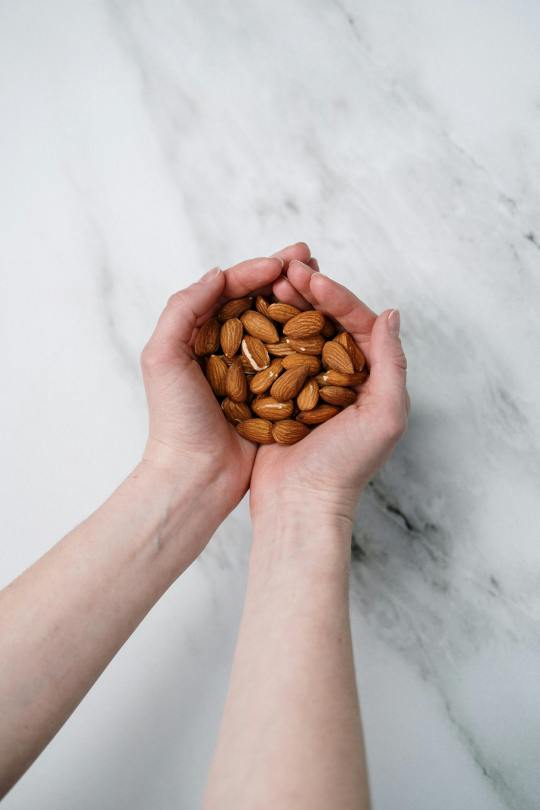
In the quest for better health, the role of fats in our diet often comes under scrutiny. However, not all fats are created equal. In fact, there's a treasure trove of healthy fats that can significantly benefit our overall well-being when incorporated into our daily meals. In this essential guide, we'll explore the top 10 healthy fats to add in your diet, along with practical tips on how to integrate them seamlessly into your culinary routine.
1. Avocado:
Let's kick off our list with the beloved avocado. Creamy and indulgent, avocados are not just a trendy food; they're a nutritional powerhouse. Packed with heart-healthy monounsaturated fats, avocados can help lower bad cholesterol levels and reduce the risk of heart disease. Whether sliced on toast, mashed into guacamole, or blended into smoothies, avocados are a versatile addition to any diet.
2. Olive Oil:
Next up is olive oil, a cornerstone of Mediterranean cuisine and a favorite among health enthusiasts. Rich in monounsaturated fats and antioxidants, olive oil boasts anti-inflammatory properties and can support cardiovascular health. Drizzle it over salads, use it for sautéing vegetables, or simply dip bread into it for a flavorful and nutritious experience.
3. Salmon:
When it comes to healthy fats, fatty fish like salmon reign supreme. Loaded with omega-3 fatty acids, particularly EPA and DHA, salmon is a powerhouse for brain health and heart function. Incorporating salmon into your diet at least twice a week can provide a substantial boost of these essential fats, whether baked, grilled, or poached to perfection.
4. Walnuts:
Crunchy and satisfying, walnuts are not just a tasty snack; they're also packed with omega-3 fatty acids, antioxidants, and protein. Snacking on walnuts can help lower cholesterol levels, reduce inflammation, and support heart health. Sprinkle them over salads, oatmeal, or yogurt for a nutritious crunch that's hard to beat.
5. Chia Seeds:
Despite their tiny size, chia seeds pack a nutritional punch. Rich in omega-3 fatty acids, fiber, and protein, chia seeds are a fantastic addition to any diet. Sprinkle them over cereal, mix them into smoothies, or use them to make chia pudding for a healthy and satisfying treat.
6. Flaxseeds:
Ground flaxseeds are another excellent source of omega-3 fatty acids and fiber. Incorporating flaxseeds into your diet can help support digestive health and reduce the risk of heart disease. Stir them into your morning oatmeal, blend them into smoothies, or use them as an egg substitute in baking recipes for an added nutritional boost.
7. Coconut:
While coconut is often associated with indulgence, it also offers a variety of health benefits. Rich in medium-chain triglycerides (MCTs), coconut can provide a quick source of energy for the body. Incorporate coconut oil, coconut milk, or shredded coconut into your cooking and baking for a tropical twist that's as nutritious as it is delicious.
8. Almonds:
A handful of almonds can do wonders for your health. Packed with monounsaturated fats, vitamin E, and antioxidants, almonds are a satisfying snack that can help curb hunger and support heart health. Enjoy them on their own or add them to salads, stir-fries, or homemade granola for an extra crunch.
9. Soybeans:
Soybeans are a versatile legume that's rich in polyunsaturated fats and high-quality protein. Incorporating soybeans into your diet can help support heart health and regulate blood sugar levels. Whether you opt for tofu, tempeh, edamame, or soy milk, there are plenty of delicious ways to enjoy the nutritional benefits of soybeans.
10. Dark Chocolate:
Yes, you read that right – dark chocolate can be a part of a healthy diet when enjoyed in moderation. Dark chocolate contains monounsaturated fats, antioxidants, and flavonoids, which have been linked to numerous health benefits, including improved heart health and cognitive function. Choose dark chocolate with a high cocoa content and minimal added sugars for maximum health benefits.
Incorporating these top 10 healthy fats into your diet can provide a multitude of health benefits, from supporting heart health to boosting brain function. Experiment with different recipes and cooking methods to discover delicious ways to enjoy these nutritious fats in your daily meals. Remember, moderation is key, so enjoy these foods as part of a balanced diet for optimal health and well-being. For more information follow @sattvanutrition, https://sattvanutrition.com/
1 note
·
View note
Text
Astaxanthin Supplement from Algae Reviews
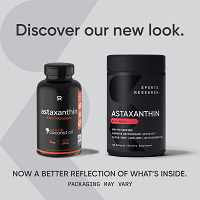
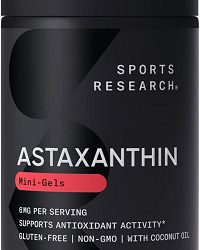

Astaxanthin Supplement from Algae: The Power of Nature for Antioxidant, Skin, and Eye Health
In the realm of natural supplements, astaxanthin has emerged as a powerhouse compound, celebrated for its potent antioxidant properties and myriad health benefits. Derived from algae, particularly Haematococcus pluvialis, astaxanthin is a carotenoid pigment that gives salmon, shrimp, and flamingos their vibrant pink hues. When harvested from algae, astaxanthin is a sustainable, plant-based source of this remarkable nutrient.
Antioxidant Armor
Astaxanthin is renowned for its exceptional antioxidant capacity, which is significantly greater than that of other well-known antioxidants like vitamin C, vitamin E, and beta-carotene. This natural compound helps combat oxidative stress in the body by neutralizing free radicals, unstable molecules that can cause cellular damage and accelerate aging. By reducing oxidative stress, astaxanthin contributes to overall health and longevity.
Skin Health Support
One of the standout benefits of astaxanthin is its ability to promote skin health and appearance. Research suggests that astaxanthin can help improve skin elasticity, moisture levels, and reduce the appearance of fine lines and wrinkles. By protecting skin cells from oxidative damage, astaxanthin also supports skin resilience against environmental stressors like UV radiation, making it a valuable addition to skincare routines.
Eye Health Enhancement
Astaxanthin’s benefits extend to eye health as well. Studies have shown that astaxanthin can help protect the eyes from age-related vision problems, such as macular degeneration and cataracts, by shielding sensitive ocular tissues from oxidative damage. Regular supplementation with astaxanthin may contribute to maintaining healthy vision, especially as we age.
Algae-Derived Astaxanthin with Coconut Oil
Astaxanthin supplements often combine this potent antioxidant with coconut oil as a carrier. Coconut oil is chosen for its high content of medium-chain triglycerides (MCTs), which enhance the absorption of fat-soluble nutrients like astaxanthin. This combination not only ensures the bioavailability of astaxanthin but also provides additional health benefits associated with MCTs, such as supporting brain function and energy levels.
Sustainability and Quality
Opting for astaxanthin sourced from algae aligns with sustainable practices, as it eliminates the need to harvest the compound from marine animals. Algae cultivation is environmentally friendly and reduces pressure on marine ecosystems. When choosing an astaxanthin supplement, it’s essential to select products that are third-party tested for purity and potency, ensuring that you reap the full benefits of this remarkable nutrient.
Incorporating Astaxanthin into Your Wellness Routine
Whether you're looking to boost your antioxidant defenses, support skin health, or promote eye wellness, incorporating astaxanthin into your daily wellness regimen could be a game-changer. Consult with a healthcare professional before starting any new supplement to determine the right dosage and ensure it complements your overall health goals.
In conclusion
, astaxanthin derived from algae offers a natural, sustainable, and effective way to enhance antioxidant protection, support skin vitality, and promote eye health. When combined with coconut oil for enhanced absorption, astaxanthin becomes a valuable addition to any health-conscious individual’s daily routine. Embrace the power of nature with astaxanthin and experience its transformative benefits firsthand.
#Astaxanthin Supplement from Algae - for Antioxidant Activity#Skin & Eye Health Support - Made with Coconut Oil Reviews
0 notes